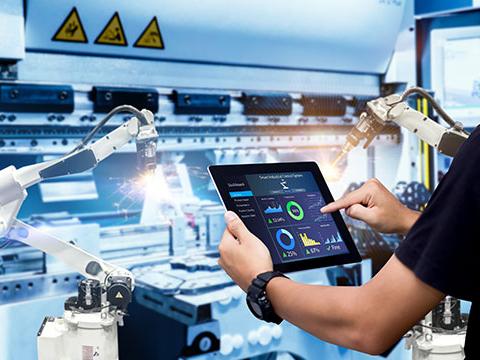
Posted to News on 15th Nov 2023, 09:44
Solving the UK productivity challenge with control technology

Stephen Hayes, managing director of automation and control technology specialist, Beckhoff UK, explains how control technology can play a key role in solving the UK’s productivity puzzle.
According to the latest figures from the Office for National Statistics, output per hour worked was just 0.6 per cent above its pre-pandemic 2019 average in the first quarter of 2023. This leaves the UK’s productivity on the same slow upward trajectory that it has followed since the financial crisis – and well below the trend that prevailed between the early 1970s and 2008. Here,
The UK’s productivity has not made significant progress since before the Covid-19 pandemic. Since the financial crisis, it has been on a relatively weak growth path, as the productivity progress has not been strong enough to match the historical trend that existed for several decades prior to 2008.
Consequently, this puts the overall economic health and competitiveness of the country at risk, with productivity being a key driver of economic growth and living standards. For example, low productivity in a country's manufacturing sector can erode competitiveness, which leads to higher production costs, reduced exports, slower economic growth and potential job losses.
However, automation can mitigate these risks as automated processes streamline production and increase efficiency. In fact, many employees and leaders already view automation as a complementary tool, with Harvard Business Review reporting that more than 90 per cent of recently surveyed workers said automation increased their productivity.
It’s time to square the circle of companies being aware of the automation benefits at a time when the UK finds itself in a productivity blackhole.
Lagging behind
The IFR World Robotics Industrial Robots 2022 report states that at 2,054, the number of new robot installations was down seven per cent year on year. Not only does this give the UK an average manufacturing robot density of 111 for every 10,000 employees, but it also places the nation at 24th in the world for robot density rankings.
In comparison, this figure is well below the global average of 141 and significantly under the top performing nations, with Republic of Korea having installed 1,000 and the European frontrunner, Germany, with 397. Other European countries, including Slovenia, Slovakia, Finland and Hungary are also ahead of the UK when it comes the uptake of robotics.
Despite the damning figures, productivity levels could easily improve by increasing the adoption of automation. This has been proven by countries with a similar share of manufacturing in their GDP, such as the US, the Netherlands, Denmark and Sweden that have higher productivity rates due to automation.
Take a German worker as an example. BNN Bloomberg recently reported that the UK generated just £46.92 of output for every hour worked compared to £55.83 in Germany, which can be attributed to the greater use of automation in German manufacturing. With that in mind, it is no surprise to see the positive correlation between Germany’s productivity levels and it topping the European rankings for robot uptake.
The main misconception
The hesitation among manufacturers to embrace IoT often stems from concerns about the perceived complexity, cost and potential disruptions associated with implementing these technologies.
According to Avnet Silica, 27 per cent say the technological demands are prohibitive. While this might ring true in very few instances, we find that the heart of the issue often lies in a lack of awareness or understanding of the available IoT options. Regrettably, some companies are unsure of how to proceed on IoT initiatives or simply make technology choices that are not aligned with their unique requirements.
Such missteps when adopting IoT can lead to resource wastage and missed chances for productivity and cost improvements. Therefore, plant managers must seek effective guidance, which is crucial for companies wanting to make informed choices when looking for tailored options.
A helping hand
Industrial automation, such as programmable logic controllers (PLCs), human-machine interfaces (HMIs) and motion control systems, enable manufacturers to reap efficiency gains.
Firstly, PLCs facilitate precise and automated control of machinery, while HMIs offer intuitive interfaces for monitoring, and motion control systems ensure precise movement to enhance production quality. Collectively, these technologies streamline processes, minimise downtime and maximise resources.
Digital options, such as Beckhoff’s TwinCAT automation software, is a good way to start. By seamlessly integrating with various hardware platforms, TwinCAT software ensures efficient control and synchronisation of machines and processes.
For instance, let’s say a facility has robotic arms, conveyor belts and computer numerical control (CNC) machines. TwinCAT can communicate with these devices, using protocols like EtherCAT or OPC UA, and collect data from sensors and devices in real time, including monitoring temperature, speed and quality checks. This intelligence is then processed within TwinCAT to make decisions or adjustments, be it to improve the robot's path, adjust conveyor speed or fine tune CNC machine parameters.
In essence, such software acts as a unifying bridge that syncs the various elements of industrial automation. This makes it a highly effective tool for the manufacturing sector and offers a means to escape the enduring output plateau that has plagued the UK since the aftermath of the 2008 financial crisis, helping to solve the productivity puzzle.
Want the latest machine building news straight to your inbox? Become a MachineBuilding member for free today >>















